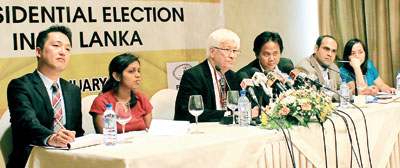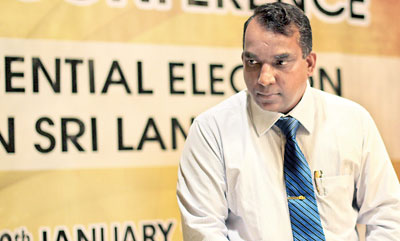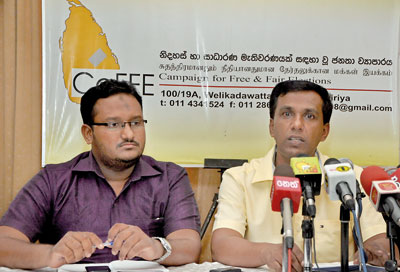News
Monitors give thumbs up for peaceful poll
View(s):The presidential election was held very peacefully and free from violence compared to past elections of Sri Lanka, if not in the South Asian region, international and local monitors said yesterday.
Dr. S.Y. Quraishi, former Chief Elections Commissioner of India, noted that the elections went extremely well and were conducted professionally, reflecting the maturing of Sri Lankan democracy.

ANFREL monitors. Pic by Amila Gamage
A nine-person international team of election monitors from India headed by its former chief election commissioner was here to monitor the election process.
“Before the official announcement from the Elections Commissioner the outgoing president took steps for a smooth transition of power. It indicates the great maturity of the nation,” Dr. Quraishi said.
Dr. Quraishi, who visited the North after receiving complaints from opposition parties that there was a risk of voter intimidation by the military, said the polling environment was conducive to normal political activity.
“We did not see any intimidation or military presence in the electoral activities. Fears of army deployment before the polls were not well founded,” he said.
The Asian Network for free Elections (ANFREL), an independent network of Asian election observers, said the presidential election was held in a “largely peaceful manner without any significant violence”.
ANFREL said its observers witnessed “a smooth and transparent polling and counting process with only isolated irregularities and violence”.
At the conclusion of its monitoring activity ANFREL suggested the adoption of improvements to Sri Lanka’s election process.

PAFFREL’s Executive Director Rohana Hettiarachchi. Pic by Anurada Bandara
“ANFREL urges Sri Lanka to enact and enforce adequate electoral laws including measures to level the playing field, empower the Department of Elections, institute campaign finance regulations, ensure freedom of the media, and strengthen regulations over the misuse of state resources. These key elements are absent from the current election law,” ANFREL’s Mission Head Damaso Magbual said.
The Complaints Unit at the Election Secretariat said many of the complaints received on election day related to violations of election law, with no serious violence being reported.
“Consideration of all the complaints reported to us showed there were no major incidents of violence but complaints about misuse of public property and resources were significantly high. All the complaints were investigated by the police and the perpetrators were arrested,” an official attached to the unit said.
The Centre for Monitoring Election Violence (CMEV) said voting “was not significantly distorted by violence and malpractice and the turnout was relatively high reflecting the level of interest in the election despite the short campaign period”.
CMEV added: “The Northern Province witnessed a number of attempts to impact voter turnout on election day through intimidation, threats and confusing messages.

CaFFE monitors hold a press conference. Pic by Nilan Maligaspe
“The call for a boycott and attempts to discourage voting for the Common Opposition Candidate through the circulation of unsolicited text messages and handbills, all contributed to a charged and confused environment. This, coupled with two explosions – one each in Jaffna and Vavuniya, respectively – could have impacted the relatively lower turnout than expected in these districts.”
The People’s Action For Free and Fair Elections (PAFFREL) said the presidential election took place under peaceful conditions.
“On election day, PAFFREL had 35 international monitors, 11,200 stationary monitors and 360 mobile teams deployed across the island. There was no major incident of violence or violations reported,” PAFFREL Executive Director Rohana Hettiarachchi said. The Network of Election Monitoring (NEM), an arm of Intellectuals for Human Rights (IHR) said as all the candidates were not given an equal playing field it considered the election was not held in a free and fair manner.
“The United People’s Freedom Alliance (UPFA) candidate, Mahinda Rajapaksa, used an immense amount of public resources and state power during the election campaign activities while the other candidates lacked resources to counter such a massive campaign. Particularly in the state media they were not given enough space to campaign; that would have had an impact on voters in rural areas,” said NEM Secretary, Chamindra Gunasekara.

